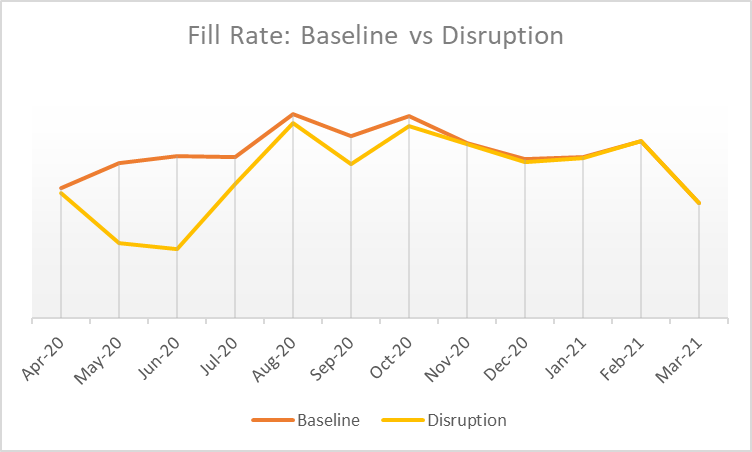Vinod Arekar is a service supply chain expert at PTC and as a Fellow he leads strategic initiatives overseeing several accounts to ensure success. Vinod’s strategic thinking and experience have helped bring the concept and application of Service Simulation to PTC. This and other innovations have helped propel Servigistics to be recognized as the industry leading service parts optimization solution. Vinod is a popular presenter at the annual LiveWorx event from sharing exciting success stories together with the clients with which he collaborates.
Faced with a major supply chain disruption due to the COVID-19 pandemic, Thermo Fisher Scientific joined hands with PTC Servigistics and SimAcumen to understand the impact of the disruption and mitigate it with the creative use of Monte Carlo simulations.
This article is a first-hand narration of the success story by Mark Hermans, Project Lead, Thermo Fisher Scientific and Vinod Arekar, VP, Business Development & Strategy, PTC.
Background
Thermo Fisher Scientific is a global leader in electron microscopy, and their customers expect critical instruments to have very little downtime. Thermo Fisher relies on PTC’s Servigistics Service Parts Management solution to meet their challenging service level agreements at an optimal cost.
Early in 2020, COVID-19 started to disrupt supply chains across the globe in all industries. In the case of Thermo Fisher, while demand stayed strong, suppliers ran into shutdowns and capacity constraints, which resulted in missing some service level objectives. With lead times increased due to supplier constraints, the safety stock was not sufficient to meet the unabated demand, and increasing safety stock was not an option because of the constraints already faced by suppliers.
Supply chain disruptions are known to have a domino effect as backorders get accumulated, and the impact lasts much longer than the disruption itself. Furthermore, the impact is dependent on several factors, such as current inventory position, forecast, lead time, and variability. The large number of variables and the stochastic nature of the problem makes it hard to understand the true impact of the disruption. Since the service level agreements have direct and long-lasting impact on the bottom line, it is critical to find a solution quickly. Thermo Fisher needed to understand the extent of the impact, develop a mitigation strategy, test it, and implement it in a short amount of time to ensure success.
Understanding the Impact
Monte Carlo simulations are a recommended best practice in managing complex supply chains. Since they provide a statistically accurate way to study perturbations, they are the tool of choice in handling disruptions and verifying mitigation strategies. PTC Servigistics partnered with SimAcumen for service supply chain simulations, and modeled the COVID-19 disruption scenario that Thermo Fisher was facing. The model showed that a two-month long disruption would have a significant negative impact on customer-facing service level in the coming months, and that the impact of the disruption would last about 8 months. The comparison of the fill rate baseline vs. disruption are shown in the below graph. The gap between the two lines was large enough to be detrimental to the business.

Following this modeling exercise, the team monitored service metrics closely and confirmed that the model prediction was accurate. Monte Carlo simulations helped Thermo Fisher understand the size and duration of the impact of the disruption.
Mitigation
Understanding the service supply chain impact is an important first step toward taking corrective action and mitigating the impact. When suppliers are facing capacity constraints, a broad-brush approach to improve performance across the board is typically impractical. However, you can collaborate with them and incentivize them to redirect their resources to fixing problems for specific parts. The critical challenge is to find where the bang for the buck is – the level of complexity is the same as understanding the impact of the disruption.
PTC Servigistics developed a mitigation strategy for Thermo Fisher using SimAcumen’s simulation results, to identify critical parts based on their customer-facing fill rate performance. By analyzing simulation results, a couple dozen parts were identified (out of several thousand parts) as critical based on current state, so suppliers could focus on delivering those on time. Simulation also provided a way to calculate impact of the collaborative approach with suppliers. As you see in the below graph, most of the impact of disruption is mitigated by just focusing on two dozen essential parts. Thermo Fisher implemented the strategy immediately following the analysis.

Conclusion
In service supply chains, it is hard to understand the true impact of disruptions. Monte Carlo simulation, a long-known best practice in helping to manage service supply chains, provides a statistically accurate way to calculate time-phased impact of disruptions. As a well-suited tool of choice, simulation provides a way to develop and evaluate a mitigation strategy, and complements a strong service parts management software. Thermo Fisher leveraged cutting edge technology and thought leadership to develop, test and implement a solution to overcome COVID-19 disruptions in a timely manner.